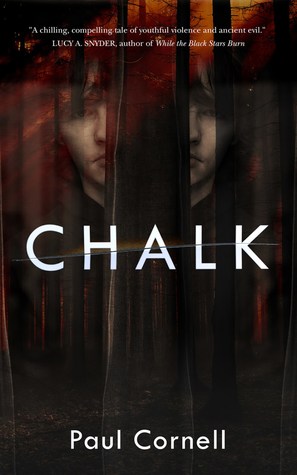Chalk
Paul Cornell
Tor.com, 2017
Paul Cornell has written comics for Vertigo, DC, and Marvel, and for the Doctor Who TV series. That was enough to interest me in an advance copy of this novel. None of his previous work prepared me for this, although Vertigo comes closest. It tells the story of a British schoolboy named Andrew Waggoner during the Margaret Thatcher years (the 1980s). Andrew is a social outcast at school, desperately trying to avoid the school bullies, led by a boy named Drake. But one night they force him into the woods outside of school, and their taunting leads to a horrific act of physical mutilation--far outside the usual bounds of bullying. Andrew chooses to hide the event from his parents and the authorities, a decision that is psychologically convincing in context: such an accusation would mean he could never hope to fit in.
But it sends him into a dark place. Andrew finds himself in the the hills of the West Country, where a chalk horse marks a site of ancient power. There his dark half emerges, a being he always refers to as Waggoner, as if he was a separate, distinct person that normally only Andrew can see and hear. Waggoner is the soul of vengeance and rage. He tells Andrew that he can only be healed and made whole through sacrifice. One by one Andrew's torturers are killed in terrible ways, which somehow are always made to look like accidents.
At the same time Andrew is trying to make his way at school. Surprisingly, he becomes part of Drake's crew. Drake's girlfriend is obsessed with tracking the Number One hits on the pop music chart each week, which she treats like auguries of the future; Andrew also marks his life by them. There are also frequent references to Doctor Who, which I imagine would be appropriate to the time and place even if Cornell was not connected to the show. All of this teenage angst forms an ironic counterpoint to the horror. And in fact Andrew often seems emotionally disconnected from it, since it's being done by his double, not him. The story often keeps that connection blurry: is Waggoner a psychological construct that frees Andrew to do things he could not, or is he a real independent being? It's never completely resolved, but the climax makes it appear that the ancient world of magic is real--and Andrew makes his choice.
Chalk is deeply unsettling, which is surely a sign of its power, although it also makes me hesitant to recommend it. The closest comparison I can make is to the work of Clive Barker, where humans can fall into the deepest pits of evil.

Replies
I'll have to check this out when I'm in the mood for something dark. I'm enjoying his Witches of Lytchford series on novellas on my Kindle app -- they're somewhat lighter modern fantasy fare.
And I'll have to look for the novellas--this is the first Cornell prose work I've read. The darkness is counterbalanced by all the geeky pop music and Doctor Who references: takes me back to young adult days when pop music meant that much to me.
Nice! Yeah, there's a time when it definitely means the world.
I first heard of the Lychford novels on Kurt Busiek's twitter feed. Every time he recommends a book on that feed, it's an absolute winner -- I have a feeling that he and I are ridiculously simpatico on our values for entertainment.
I got a nudge from Kieron Gillen on Chalk. He mentioned it favorably in his April 12 newsletter, which reminded me I had the advance copy downloaded and hadn't read it yet.